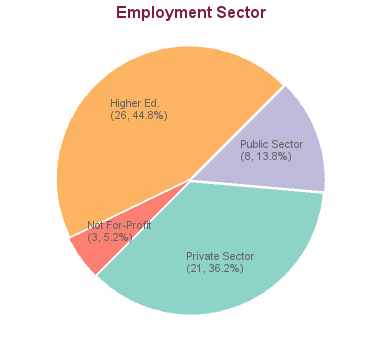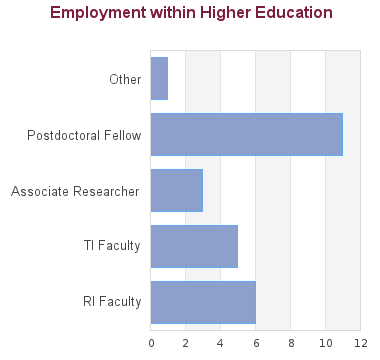
Jenna Riffell
Job Title
Vice President
Employer
Kx Advisors

Review details about the recently announced changes to study and work permits that apply to master’s and doctoral degree students. Read more
The Biochemistry and Molecular Biology Graduate Program provides advanced, research-based education that will prepare students for a career in academic, industrial, or professional positions in British Columbia and beyond. The Program offers MSc and PhD degrees, with the option to transfer from the MSc into the PhD track during the second year. The bulk of the program is research-intensive and assessed by examination of a dissertation, although students starting in the MSc program are required to take six formal course credits, which are usually completed within the first two academic terms. Course topics include protein structure and function, gene regulation, epigenetics, membrane structure and function, cellular regulation, and bioinformatics. Students also present a departmental research seminar in each year of their program, contribute to peer-reviewed publications, and present their work at local, national, or international meetings.
The Department of Biochemistry and Molecular Biology is home to more than thirty, highly funded, well-equipped, research groups, that seek to understand the molecular basis of multiples diseases, including diabetes, cardiovascular disease, autism, Alzheimer’s disease, retinal degenerative diseases, bacterial and viral infections, including COVID-19. The Department has a rich history and on-going record of exceptional academic and research excellence. The Department was home to Nobel Laureate, Michael Smith, and current members hold research chairs, Killam awards and are members of the Royal Society of Canada. While the majority of our research laboratories are located in the Life Sciences Institute and Michael Smith Laboratories on the Point Grey Campus, member labs are also found in the BC Cancer Research Centre, the Centre for Brain Health, the Centre for Blood Research, and the Child and Family Health Research Institute. Thus, our program offers trainees a broad range of research topics, world-class mentorship, and diverse training environments. We encourage you to visit the Department website to check out the specific research interests and achievements of the professors in the Department.
The Faculty of Graduate and Postdoctoral Studies establishes the minimum admission requirements common to all applicants, usually a minimum overall average in the B+ range (76% at UBC). The graduate program that you are applying to may have additional requirements. Please review the specific requirements for applicants with credentials from institutions in:
Each program may set higher academic minimum requirements. Please review the program website carefully to understand the program requirements. Meeting the minimum requirements does not guarantee admission as it is a competitive process.
Applicants from a university outside Canada in which English is not the primary language of instruction must provide results of an English language proficiency examination as part of their application. Tests must have been taken within the last 24 months at the time of submission of your application.
Minimum requirements for the two most common English language proficiency tests to apply to this program are listed below:
Overall score requirement: 106
Reading
27
Writing
29
Speaking
24
Listening
27
Overall score requirement: 7.5
Reading
7.0
Writing
7.0
Speaking
7.0
Listening
7.0
Some programs require additional test scores such as the Graduate Record Examination (GRE) or the Graduate Management Test (GMAT). The requirements for this program are:
The GRE is required by some applicants. Please check the program website.
All applicants have to submit transcripts from all past post-secondary study. Document submission requirements depend on whether your institution of study is within Canada or outside of Canada.
A minimum of two references are required for application to graduate programs at UBC. Each graduate program determines the type of reference (e.g. academic, professional) and number of references they require which can range from 2 to 4. References should be requested from individuals who are prepared to provide a report on your qualifications for the program.
Many programs require a statement of interest, sometimes called a "statement of intent", "description of research interests" or something similar.
Students in research-based programs usually require a faculty member to function as their thesis supervisor. Please follow the instructions provided by each program whether applicants should contact faculty members.
Permanent Residents of Canada must provide a clear photocopy of both sides of the Permanent Resident card.
All applicants must complete an online application form and pay the application fee to be considered for admission to UBC.
| Fees | Canadian Citizen / Permanent Resident / Refugee / Diplomat | International |
|---|---|---|
| Application Fee | $116.25 | $168.25 |
| Tuition * | ||
| Installments per year | 3 | 3 |
| Tuition per installment | $1,875.34 | $3,294.66 |
| Tuition per year (plus annual increase, usually 2%-5%) | $5,626.02 | $9,883.98 |
| Int. Tuition Award (ITA) per year (if eligible) | $3,200.00 (-) | |
| Other Fees and Costs | ||
| Student Fees (yearly) | $1,144.10 (approx.) | |
| Costs of living | Estimate your costs of living with our interactive tool in order to start developing a financial plan for your graduate studies. | |
Applicants to UBC have access to a variety of funding options, including merit-based (i.e. based on your academic performance) and need-based (i.e. based on your financial situation) opportunities.
Successful applicants to this program will be provided with a base funding package of at least $33,250/year for each of the first two years of an MSc or four years of a PhD program. Students awarded major (i.e. greater than $15,000 per year), merit-based (for example: NSERC/CIHR CGSM, NSERC PGSD, or UBC Four-Year Fellowships) awards will receive a minimum of $36,250/year financial support. PhD students, except those who have their tuition paid by an external sponsor, will additionally receive the Presidents Academic Excellence Initiative PhD Award, PAEIPA. Additionally, with the exception of Alexander Graham Bell Canada Graduate Scholarship or Vanier Canada Graduate Scholarship recipients, tuition for the first four years of a PhD will be covered by either UBC or a BMB Graduate Tuition Award. These minimum support packages can be further supplemented by TAships, and overall, the average support package for graduate students exceeds $36,250 per annum.
This results in a net balance (any funding provided to the student minus tuition and fees) mean of $37,103 and median of $37,197.
All applicants are encouraged to review the awards listing to identify potential opportunities to fund their graduate education. The database lists merit-based scholarships and awards and allows for filtering by various criteria, such as domestic vs. international or degree level.
Many professors are able to provide Research Assistantships (GRA) from their research grants to support full-time graduate students studying under their supervision. The duties constitute part of the student's graduate degree requirements. A Graduate Research Assistantship is considered a form of fellowship for a period of graduate study and is therefore not covered by a collective agreement. Stipends vary widely, and are dependent on the field of study and the type of research grant from which the assistantship is being funded.
Graduate programs may have Teaching Assistantships available for registered full-time graduate students. Full teaching assistantships involve 12 hours work per week in preparation, lecturing, or laboratory instruction although many graduate programs offer partial TA appointments at less than 12 hours per week. Teaching assistantship rates are set by collective bargaining between the University and the Teaching Assistants' Union.
Academic Assistantships are employment opportunities to perform work that is relevant to the university or to an individual faculty member, but not to support the student’s graduate research and thesis. Wages are considered regular earnings and when paid monthly, include vacation pay.
Canadian and US applicants may qualify for governmental loans to finance their studies. Please review eligibility and types of loans.
All students may be able to access private sector or bank loans.
Many foreign governments provide support to their citizens in pursuing education abroad. International applicants should check the various governmental resources in their home country, such as the Department of Education, for available scholarships.
The possibility to pursue work to supplement income may depend on the demands the program has on students. It should be carefully weighed if work leads to prolonged program durations or whether work placements can be meaningfully embedded into a program.
International students enrolled as full-time students with a valid study permit can work on campus for unlimited hours and work off-campus for no more than 24 hours a week during academic sessions.
A good starting point to explore student jobs is the UBC Work Learn program or a Co-Op placement.
Students with taxable income in Canada may be able to claim federal or provincial tax credits.
Canadian residents with RRSP accounts may be able to use the Lifelong Learning Plan (LLP) which allows students to withdraw amounts from their registered retirement savings plan (RRSPs) to finance full-time training or education for themselves or their partner.
Please review Filing taxes in Canada on the student services website for more information.
Applicants have access to the cost estimator to develop a financial plan that takes into account various income sources and expenses.
66 students graduated between 2005 and 2013: 2 are in non-salaried situations; for 6 we have no data (based on research conducted between Feb-May 2016). For the remaining 58 graduates:


During the past year we undertook a detailed survey of all graduates who completed their graduate programs in the period from 2003-2014. Of the total of 138 graduates, we have tracked the career progress of more than 120 so far. Of this total, 35 have completed further training in graduate and postdoctoral positions, 20 have entered a professional program (mostly in Law or Medicine), 11 have progressed to a tenure-stream faculty position and 32 have full-time research positions in academia (8), industry (21) or government departments (3). Others have established careers in technical writing or management and the most recent cohort (13) are still at a very early stage of career development. Although we need to continue to track and refine our understanding of career outcomes, it is very clear that our programs enable our graduates to achieve career success in a number of academic, professional and commercial areas.
These statistics show data for the Doctor of Philosophy in Biochemistry and Molecular Biology (PhD). Data are separated for each degree program combination. You may view data for other degree options in the respective program profile.
| 2023 | 2022 | 2021 | 2020 | 2019 | |
|---|---|---|---|---|---|
| Applications | 14 | 21 | 26 | 15 | 22 |
| Offers | 2 | 6 | 7 | 1 | 3 |
| New Enrolment | 1 | 3 | 6 | 1 | 3 |
| Total Enrolment | 52 | 50 | 44 | 45 | 50 |
Students in research-based programs usually require a faculty member to function as their thesis supervisor. Please follow the instructions provided by each program whether applicants should contact faculty members.
These videos contain some general advice from faculty across UBC on finding and reaching out to a supervisor. They are not program specific.
| Year | Citation |
|---|---|
| 2020 | Dr. Alexander examined the molecular basis of two mechanisms of antibiotic resistance found in the bacterial pathogen Staphylococcus aureus. His characterisation of protein-antibiotic interactions using x-ray crystallography and kinetics contributes insight into how resistance occurs and could guide the development of new and improved antibiotics. |
| 2020 | Dr. Majewski studied the atomic structure of the bacterial type 3 secretion system, a syringe-like nanomachine used to hijack host cells. Her research has improved our understanding of how the system is assembled, creating a foundation for future drug design against pathogenic bacteria such as Salmonella and E. coli. |
| 2020 | Dr. Kolehmainen studied ketogenic diet and ketone ester supplementation as potential treatments in preclinical models of spinal cord injury. She demonstrated that a ketogenic diet can reduce certain features of inflammation underscoring the importance of nutritional interventions following spinal cord injury. |
| 2020 | Dr. Mazinani studied the relationship between Alzheimer's disease and blood clotting. He found that proteins that cause Alzheimer's disease assist in blood clotting, and that these proteins can be modified by coagulation enzymes. His findings contribute to a new understanding of potential causes of Alzheimer's disease, as well as new therapies. |
| 2020 | Dr. Caffrey applied light and electron microscopy to answer key questions in human health and disease across several size scales, from human tissue to single proteins. His research examines 3D distribution of mitochondria in tissues, the effect of novel therapeutics on cells and illuminates the role structural defects in protein play in disease. |
| 2020 | Dr. Caveney showed how the final stages of bacterial cell wall biosynthesis can be modulated. These modulations are part of both natural bacterial life but additionally can play an important role in bacterial infection. This research paves the way for improved antibacterial therapeutics. |
| 2020 | Dr. Gerak studied a protein fragment, called the PNT domain, that is present in many oncoproteins. She investigated how the PNT domain self-associates to activate these oncoproteins, thereby causing cancer, and searched for molecules that might prevent this self-association. This knowledge aids in identifying a new class of anticancer therapeutics. |
| 2020 | Dr. Workman used X-ray crystallography to study the structure-function relationship of enzymes involved in the biosynthesis of the bacterial cell wall. His structural data revealed an unexpected topology and suggested an additional function for a key membrane protein. This knowledge provides a foundation for the development of novel antibiotics. |
| 2020 | Dr. Wong studied the properties of flexible proteins that are not folded prior to binding. These proteins play critical roles in signaling and regulation by interacting with other proteins. He created a computational predictor for protein sites that bind to these flexible proteins and explored their relationship with disease-causing mutations. |
| 2020 | Dr. Ordobadi studied nanoparticles for delivery of small molecule drugs and nucleic acids. Through her studies, she looked at the effect of nanoparticle composition on therapeutic relevance. Her findings can ultimately be used to develop treatments for a range of diseases. |
Possible areas of research in Biochemistry and Molecular Biology include: control of gene expression in eukaryotes and bacteria; structure and function of genes; systems biology; blood proteins; the mechanism of the action of insulin; membrane and membrane protein structure and function; protein trafficking; cell-surface receptors, signal transduction, and cell-growth control; neural and retinal photoreceptor membranes; lipid-based targeted delivery systems; macromolecular crystallography and X-ray diffraction techniques for the characterization of enzymes and protein complexes; metalloprotein structure and function; mechanisms of enzyme activity; mechanism of hemoprotein electron transfer; structural analysis of proteins by nuclear magnetic resonance; mechanisms of multi-drug resistance; and cancer.
Departments/Programs may update graduate degree program details through the Faculty & Staff portal. To update contact details for application inquiries, please use this form.

Great academic programs, great location: the distinct seasons and mild climate are among the reasons why graduate students choose to study here -- from the autumn leaves to cherry blossoms, witness the many colours Vancouver has to offer.